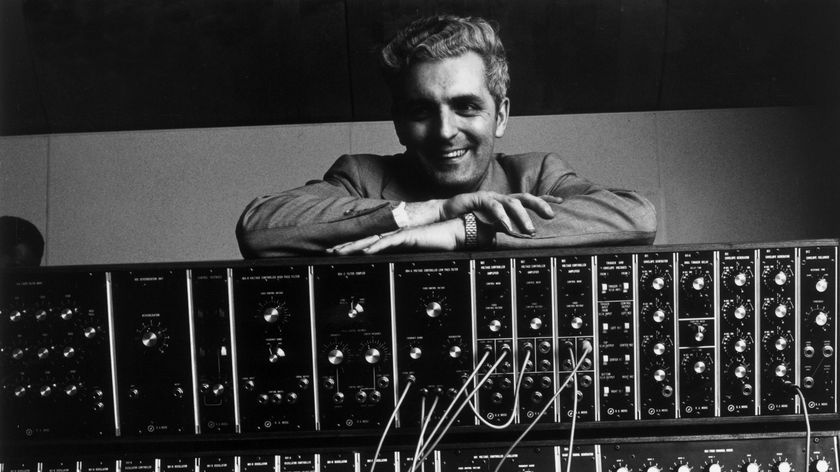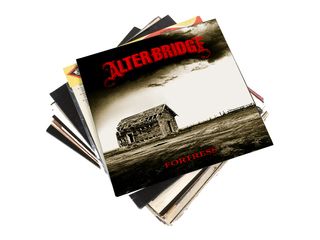
Mark Tremonti discusses Alter Bridge's new album Fortress track-by-track
When it came time for Alter Bridge to begin recording their upcoming fourth album, Fortress, the band members – lead vocalist-guitarist Myles Kennedy, lead guitarist-singer Mark Tremonti, bassist Brian Marshall and drummer Scott Phillips – decided to build on their prior LPs successes by playing fast and loose with song structures.
“We were pushing for unpredictability," Tremonti says. "The last thing we wanted was verse-chorus-verse-chorus and all that. Songs should have you never knowing what you're getting next. We messed with time signatures, tones, key changes – everything we could throw at these songs, we did.”
As they've done since 2007's Blackbird, the group worked with producer Michael "Elvis" Baskette, who, according to Tremonti, wasn't adverse to adopting a more daring approach. "Elvis never tries to simplify our ideas," he enthuses. "A lot producers might want to shave edges off things and play it safe, but Elvis pushes us to be more extreme, more creative. It’s always, ‘Hey, that’s great. Now, how far can we take that?’"
During pre-production, songs were built up and torn down; sometimes multiple treatments for each one were considered. "We just didn't want to be easily satisfied," Tremonti explains. "It's so tempting to say, 'That's it. It's perfect' the first time you have something. But you never really know it's as good as it can be until you exhaust every possibility, and that's what we did."
Tremonti re-assessed his own guitar playing, as well, starting with his use of the wah pedal, which he admits has become something of a security blanket. "I saw an online post where a fan brought it up," he says. "‘I think you should use less wah on this record,’ somebody wrote, and I thought, ‘You know what? I’m not gonna use any wah when it comes to the solos.’ I wanted to get out of my comfort zone.
“I’ve also had a tendency to do too many descending legato riffs. They became a go-to, over-the-top pattern of mine – whenever a climax would come up, I’d do some fast legato stuff. I wanted to lay off that and concentrate on phrasing. There is kind of a new trick I’m doing – this chicken pickin’-type pull-off riff that I use in a few of the solos. It’s good to change your game around and see what comes from it."
On the following pages, Tremonti walks us through the writing and recording of all 12 tracks on Fortress. The album will be released 8 October in the US and 30 September in the rest of the world. You can pre-order Fortress at iTunes, Amazon and via AlterBridge.com.
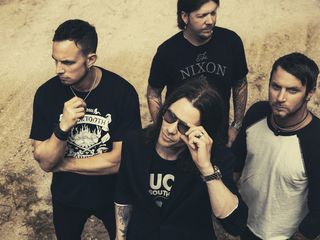
Cry Of Achilles
“When Myles and I were throwing ideas back and forth, he played me a fingerpicked bit on a nylon-string guitar. It was really great, and I just said to him, ‘Man, we’ve got to use that for an intro or incorporate it into one of the songs somehow.’
“We kind of put it on the back burner – things like that always seem to happen – but it was too good to forget about. The bulk of the song came about in pre-production; we sat down for a few days and worked on it, and in the end we felt like we caught lightning in a bottle.
“Myles and I both take solos in the song. He takes the first one, the more elastic solo, and I take the second one. He’s a great improvisational player; his bends and vibrato are so striking. My solo is more ‘stingy,’ I guess, which is a nice complement to what he does.”
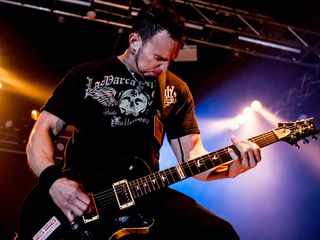
Addicted To Pain
“It’s tough to always use your own experiences when writing lyrics, and I think, in some cases, Myles looked to people around him for inspiration. Somebody close to him was venting about his problems, and Myles felt as though he could touch on certain issues.
“The solo is a funny one: I had the idea of starting it out on a single bent note. I was improvising one night and kept playing around with this way of edging into it. It’s one of my favorite solos on the album.”
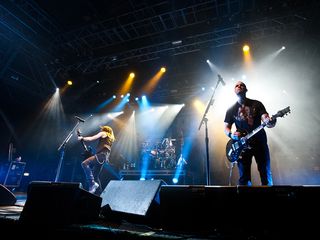
Bleed It Dry
“OK, now this is actually my favorite solo on the record. I’m playing with my fingers to make it more expressive – it affects the whole tone in a really cool way. The song itself is tuned down to drop D, so it’s one of the heavier songs. We’re definitely going to play it live.
“For amps, on this song, like on the whole album, I used the Cornford RK100, Obershaw and a little bit of Boogie. Guitar-wise, I used two guitars, both of them my signature Paul Reed Smith models. One has a fixed bridge for the rhythm stuff, and for leads I used one with the bar on it.”
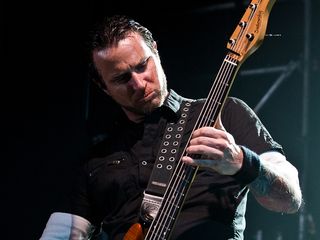
Lover
“We had most of the record together before we got to this one. The high-energy stuff was there, so we needed something to provide a different dynamic, something a little slower with a more atmospheric feel.
“There’s no real guitar solo, just a little lick before the second verse. We thought about a solo, but then we kind of left it up in the air. I was just going to improvise something, but one day I went to the studio and Elvis said, ‘You know, Myles put down this great vocal at the end; we should just forgo the solo.’ I listened to what Myles did and said, ‘Fine. It's great.' Hey, less work for me, right?" [Laughs]
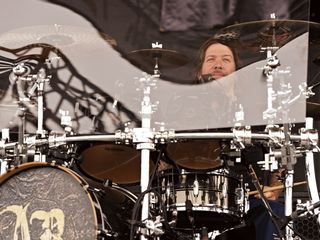
The Uninvited
“This song almost didn’t make the album. It’s got this hammer-on thing, and Scott was like, ‘That’s just like a Tool riff.’ So, for a while there, we were like, ‘OK, let’s shelve this and move on.’
“But eventually, we came back to it and said, ‘OK, let’s just make this as un-Tool-like as possible and go with it.’ Everybody is influenced by somebody or something – a lot of times, it's a subconscious thing – so if an idea is really strong, you just have to give in and see it through.
“The song was a dark horse, and for a while we were probably thinking it was a B-side track. Once we finished it, it seemed to jump out at us – I guess we didn’t know what we had all along. Now it’s one of our favorites.”
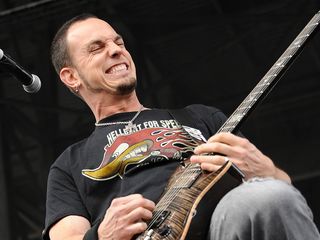
Peace Is Broken
"We’re usually so busy with our own parts that we don’t often hear what Myles is working on with lyrics until after he’s done. When I’m tracking, that’s when I sometimes hear what he’s come up with. He blows me away. There’s only been a few times where we’ve wanted to make changes to his lyrics.
“I love this chorus. When I brought it to Myles, I said, ‘This one is very important to me; let’s make it special.’ The verses came from a riff I had; I built it up with some chord changes – at first, there were no chords – and it all came together after that.
“I wanted to make the solo an emotional one, so I kind of followed the chorus melody. Actually, this was the first solo I wrote for the record. I’m pretty pleased at how it turned out.”

Calm The Fire
“Another Myles opener – he's on the nylon-string. We already had the song worked out, but he and Elvis went in one night and came up with that part as an intro. I was knocked out when I heard it. It's definitely one of the highlights on the album.
“Myles and I do a lot of cool guitar stuff together. We’re playing two totally different parts during the verses. It’s only in the pre-chorus where we sync up with each other, but for the most part, we’re trying to really complement our separate approaches. It’s always very inspiring to see what Myles comes up with. I can’t say enough about him as a guitarist.”
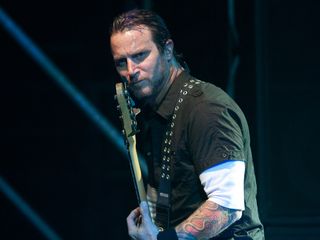
Waters Rising
“I wrote this song about a fictional apocalyptic scenario. Just watching the news every day, every week, it seems as though there’s always some way for somebody to end it all. After I’d written this song and I’d heard what Myles had done for Bleed It Dry, I was like, ‘Wow, we both went there coincidentally.’
“A lot of the solo happened by mistake. I had written a riff that I wasn’t feeling, so I was just improvising to see where I could take things. It was one of those situations where you fall down the stairs and you manage to land on your feet.
“For me, the biggest challenge was that it was my debut as a vocalist on an Alter Bridge record. A little daunting, but I think it turned out well.”
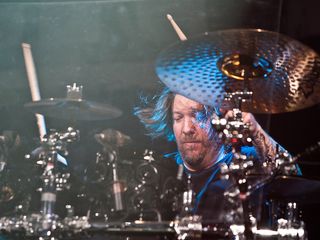
Farther Than The Sun
“We always have a go-to drop-B song on a record. This is probably our heaviest track because it’s tuned so low. It’s another one where Myles and I take back-to-back leads, which is always fun. It’ll be a highlight of our live set, I think.
“I tracked my lead first, and I didn’t hear what Myles did until I went in to do my vocals. Needless to say, I was blown away. Myles is always very soulful with his bends and the emotion he puts into his guitar playing. His vibrato and phrasing are always pretty impressive. On a few places, he really went for the shred.”
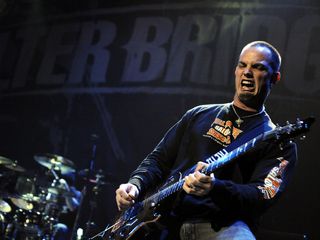
Cry A River
“Everybody’s playing these songs for the first time, so when it comes down to the arrangements, people are going, ‘Let’s try this, let’s try that.’ That’s the way a lot of these tunes come together.
“Actually, this solo was one of the tougher ones for me. I put it off for a while because of the chord progression – I just didn’t feel like it was a good sound bed for an emotional solo. One night I was up, and I came up with a little lick for the melodic phrasing for the beginning of the solo, and I was like, ‘That's it! Now I’m saved. I have something to work with here.’ After that, it came together pretty quickly.”

All Ends Well
“We added this song to the record towards the very end. We knew we needed something different for the dynamics of the album, and we also kept in mind that our fans like things like Before Tomorrow Comes – the more uplifting tunes that we’ve done in the past. Things were pretty dark and heavy, so we wanted to make sure this tune wound up on the record.
“I had the verse music for a while, and I knew that I wanted to use it for something. I think Myles knocked it out of the park with his vocal over the guitar line. It was one of those places where I couldn’t play it and sing something at the same time, so I had no idea how it should work. Myles did a great job, especially on the chorus.
"The acoustic is a drop-D with the high E turned down to D, as well. Both of the E strings are D. It’s a great sound."
“A lot of people have said that they respect how we put this song near the end of the record – some bands might immediately go for the money shot, the more pop, cross-over-type thing. I think that we just wanted to let people know that it’s not that kind of a record overall."
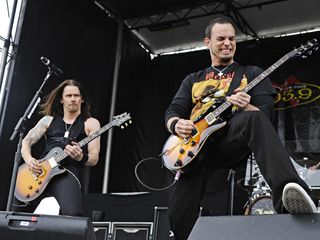
Fortress
“This is one of the first ideas that I brought to Myles music-wise. I sent him the verse and the chorus, and we kind of forgot about it after that. We came back to it after Elvis said, ‘Let me hear some of the other ideas you two worked on before we started.’ This one stuck out, and Elvis said, ‘Hey, that’s great. Let’s work on it.’
“As soon as the rhythm for the bridge came together, we all fell in love with it. Then it was a matter of getting in and out of the time signature and making all of the parts work.
“Myles and I took turns with the solos: I do the first and third, and he does the second and fourth. On the fourth round, he kind of mimics a descending thing of mine, but he does it with an ascending pattern.
“When my part happens, it’s in D because I was in open D5 tuning, which is a challenge because your B string is up a whole step and a half, so you can’t do some bendy stuff – you might snap the string. It’s hard to do some pentatonic things, as well, because your guitar’s a whole new beast when you tune it that way. I think it’s fun, though, because it doesn’t sound like standard-tuning solos.
"I made sure that I got the D portion that’s in a double-time thing, and then it switches to half-time with Myles in the key of A; after that, it goes back to D with me and back to A with him. Really cool stuff going on. Challenging ourselves on the guitar keeps things interesting for us, and I hope everybody else feels the same way.”

Joe is a freelance journalist who has, over the past few decades, interviewed hundreds of guitarists for Guitar World, Guitar Player, MusicRadar and Classic Rock. He is also a former editor of Guitar World, contributing writer for Guitar Aficionado and VP of A&R for Island Records. He’s an enthusiastic guitarist, but he’s nowhere near the likes of the people he interviews. Surprisingly, his skills are more suited to the drums. If you need a drummer for your Beatles tribute band, look him up.

“Crafted for the true metal enthusiast, this axe embodies the soul of legendary guitarist Zakk Wylde”: Paging all “shred warriors,” Wylde Audio’s Berzerker takes the shape of metal guitars to new extremes
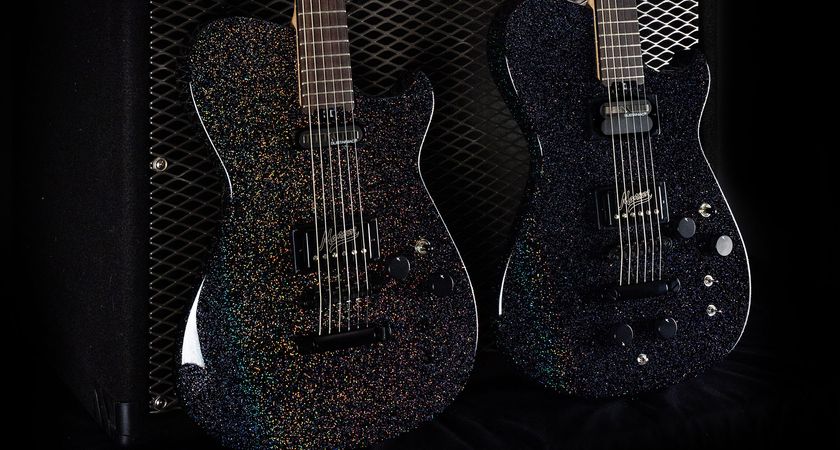
“A high-spec instrument at a competitive price”: Sustainiac pickups, onboard Z.Vexx Fuzz Factory circuits, a Night Sky Holosparkle finish? Manson lavishes Matt Bellamy-approved specs on updated M-Series electrics

“Crafted for the true metal enthusiast, this axe embodies the soul of legendary guitarist Zakk Wylde”: Paging all “shred warriors,” Wylde Audio’s Berzerker takes the shape of metal guitars to new extremes

“A high-spec instrument at a competitive price”: Sustainiac pickups, onboard Z.Vexx Fuzz Factory circuits, a Night Sky Holosparkle finish? Manson lavishes Matt Bellamy-approved specs on updated M-Series electrics
Most Popular








